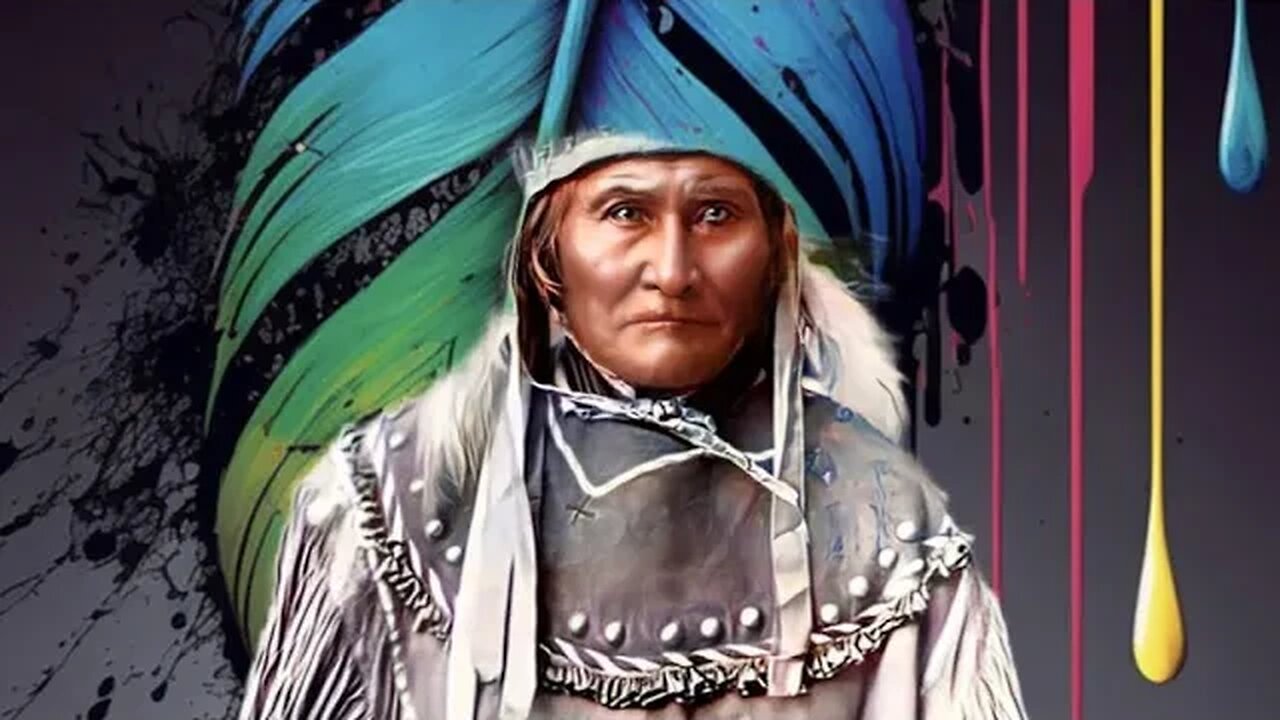Premium Only Content

Geronimo: Born Free
Geronimo was a Bedonkohe Apache leader of the Chiricahua Apache, who led his people's defense of their homeland against the military might of the United States.
Geronimo was an Apache leader who continued the tradition of the Apaches resisting white colonization of their homeland in the Southwest, participating in raids into Sonora and Chihuahua in Mexico. After years of war, Geronimo finally surrendered to U.S. troops in 1886. While he became a celebrity, he spent the last two decades of his life as a prisoner of war.
Early Years
A legend of the untamed American frontier, the Apache leader Geronimo was born in June 1829 in No-Doyohn Canyon, Mexico. He was a naturally gifted hunter, who, the story goes, as a boy swallowed the heart of his first kill to ensure a lifetime of success on the chase.
Being on the run certainly defined Geronimo's way of life. He belonged to the smallest band within the Chiricahua tribe, the Bedonkohe. Numbering a little more than 8,000, the Apaches were surrounded by enemies — not just Mexicans, but also other tribes, including the Navajo and Comanches.
Around this same time, Geronimo fell in love with a woman named Alope. The two married and had three children together.
However, tragedy struck when he was out on a trading trip and Mexican soldiers attacked his camp. Word of the ransacking soon reached the Apache men. Quietly that night, Geronimo returned home, where he found his mother, wife and three children all dead.
Warrior Leader
The murders devastated Geronimo. In the tradition of the Apache, he set fire to his family's belongings and then, in a show of grief, headed into the wilderness to bereave the deaths. There, it is said, alone and crying, a voice came to Geronimo that promised him: "No gun will ever kill you. I will take the bullets from the guns of the Mexicans … and I will guide your arrows."
Backed by this sudden knowledge of power, Geronimo rounded up a force of 200 men and hunted down the Mexican soldiers who killed his family. It went on like this for 10 years, as Geronimo exacted revenge against the Mexican government.
Beginning in the 1850s, the face of his enemy changed. Following the end of the Mexican-American War in 1848, the United States took over large tracts of territory from Mexico, including areas belonging to the Apache. Spurred by the discovery of gold in the Southwest, settlers and miners streamed into their lands.
But the Chiricahua leader, Geronimo's father-in-law, Cochise, could see where the future was headed. In an act that greatly disappointed his son-in-law, the revered chief called a halt to his decade-long war with the Americans and agreed to the establishment of a reservation for his people on a prized piece of Apache property.
But within just a few years, Cochise died, and the federal government reneged on its agreement, moving the Chiricahua north so that settlers could move into their former lands. This act only further incensed Geronimo, setting off a new round of fighting.
Geronimo proved to be as elusive as he was aggressive. However, authorities finally caught up with him in 1877 and sent him to the San Carlos Apache reservation. For four long years, he struggled with his new reservation life, finally escaping in September 1881.
Out on his own again, Geronimo and a small band of Chiricahua followers eluded American troops. Over the next five years, they engaged in what proved to be the last of the Indian wars against the United States.
Perceptions of Geronimo were nearly as complex as the man himself. His followers viewed him as the last great defender of the Native American way of life. But others, including fellow Apaches, saw him as a stubborn holdout, violently driven by revenge and foolishly putting the lives of people in danger.
With his followers in tow, Geronimo shot across the Southwest. As he did, the seemingly mystical leader was transformed into a legend as newspapers closely followed the Army's pursuit of him. At one point nearly a quarter of the Army's forces — 5,000 troops — were trying to hunt him down.
Finally, in the summer of 1886, he surrendered, the last Chiricahua to do so. Over the next several years Geronimo and his people were bounced around, first to a prison in Florida, then a prison camp in Alabama and then Fort Sill in Oklahoma. In total, the group spent 27 years as prisoners of war.
Final Years and Death
While he and the rest of the Chiricahua remained under guard, Geronimo experienced a bit of celebrity from his white former enemies. Less than a decade after he'd surrendered, crowds longed to catch a glimpse of the famous Indian warrior.
His death came four years later. While riding home in February 1909, he was thrown from his horse. He survived a night out in the cold, but when a friend found him the next day, Geronimo's health was rapidly deteriorating. He passed away six days later, with his nephew at his side.
-
 1:00
1:00
Literati
1 year agoAwakening
81 -
 46:05
46:05
PMG
11 hours ago"Hannah Faulkner and Philip Toppino | Where Our Families Train"
371 -
 1:22:21
1:22:21
TheDozenPodcast
21 hours agoBroadmoor, bare knuckle, recovery: Ben Hatchett
52.3K2 -
 10:58
10:58
Degenerate Jay
1 day ago $11.02 earnedThe Rejected Deadpool And Wolverine Joke That Was Too Far For Disney
107K7 -
 13:00
13:00
Dermatologist Dr. Dustin Portela
16 hours ago $7.71 earnedAnother Insurance Company Harming Patients - Doctor Explains
76.8K5 -
 52:32
52:32
Survive History
23 hours ago $8.47 earnedCould You Survive in King George's Redcoats During the Jacobite Rising?
56.7K5 -
 17:53
17:53
Fit'n Fire
21 hours ago $5.52 earnedA Rifle for the Family -- BCM MK2 BFH and Gunnr Optics Odin 1-10x28mm LPVO
43.1K7 -
 1:03:52
1:03:52
GrassRootsWarriorNetwork
1 month agoWe The People Are The News Now While MSM Is On It’s Way Out - YourNews.com with Sam Anthony
38.2K2 -
 21:12
21:12
DeVory Darkins
16 hours ago $25.05 earnedGavin Newsom gets what he deserves after NBC Reporter FACT CHECKS his Lies
122K79 -
 1:57:13
1:57:13
MyronGainesX
17 hours agoFormer Fed Explains Sting That Led To The Murder Of A State Trooper
115K22